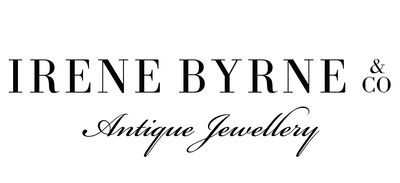Australian Amethyst Vine Leaf Locket Brooch
Irene Byrne & Co





Just in, we have this incredibly beautiful circa 1870 Australian, Victorian locket brooch with a centre Amethyst set in 18ct yellow gold. The design of this brooch is simply divine, with incredible detailing and structure. The paired Ivy leaves on-top, is a design feature true to the Australian Victorian era. This brooch would look spectacular worn at the collar of a shirt or dress.
Circa: 1870
Design Period: Victorian
Origin of Manufacture: Australia
Gemstone: Amethyst
Gemstone Measurement: 9.00 x 7.00 mm
Material: 18ct Yellow Gold
Victorian Period (1837 - 1901):
The Victorian Period defined by none other than Queen Victoria herself, had three stages - the Romantic, the Grand and the Aesthetic.
The Victorian Period defined by none other than Queen Victoria herself, had three stages - the Romantic, the Grand and the Aesthetic.
It was during the Romantic era that Queen Victoria married her Prince, Albert. Sentimental motifs such as; hearts, lover’s knots, flowers, bows, crescent moons and particularly serpents (which was subject to Queen Victoria’s engagement ring which represented enduring love) became extremely popular in jewellery design. Cameos, Enamelling and the use of bright coloured gemstones such as; garnets, amethysts, turquoise, pearls and diamonds gave way to the creation of jewellery that was beginning to speak a symbolic language of its own.
The Grand era was a sombre period which saw Queen Victoria mourning the death of her beloved husband Albert. It encompassed 20 years during which time Victoria would only wear black and mourning jewellery. As a result the Whitby Jet industry flourished and onyx and deeper coloured garnets rose in popularity. Rings, lockets and brooches were commissioned with compartments for a lock of a loved one’s hair and were often engraved with the person’s name, age and date of death.
The Aesthetic era saw a return to the light-heartedness of the Romantic Era. The discoveries being made through archaeology led to an Etruscan Revival with Greek, Roman and Renaissance influences becoming apparent in jewellery design as well as symbols of good luck and fortune.
